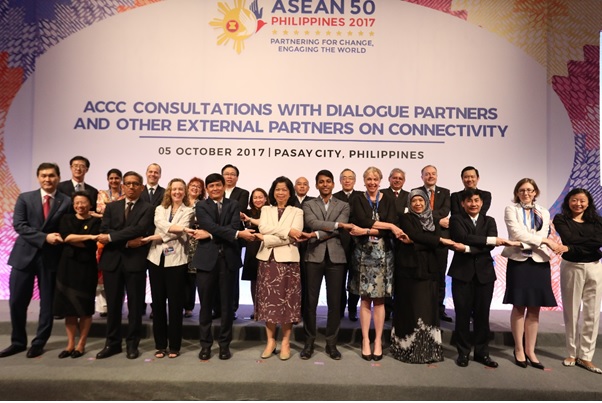
05 October 2017, Manila, Philippines – ASEAN’s external partners pledged support to the Master Plan on ASEAN Connectivity (MPAC) 2025 in a ground-breaking meeting between the ASEAN Connectivity Coordinating Committee (ACCC) and ASEAN’s Dialogue Partners and Sectoral Dialogue Partners on 5 October in Manila.
The meeting, which was attended by all ASEAN Member States, Australia, Canada, China, EU, Japan, India, Republic of Korea, New Zealand, Russia, the United States, Norway, Pakistan and Switzerland, discussed the implementation of MPAC 2025 and projects in support of the ASEAN Connectivity agenda.
Ambassador Elizabeth P. Buensuceso, Permanent Representative of the Philippines to ASEAN and ACCC Chair, emphasized ASEAN’s readiness to implement MPAC 2025 and to coordinate pledges from external partners to support project concepts for the 15 key initiatives of MPAC 2025 under the five strategic areas of sustainable infrastructure, seamless logistics, digital innovation, regulatory excellence and people mobility.
“The ACCC will utilize the project concepts developed in collaboration with stakeholders to engage with Dialogue Partners and other external partners to mobilize resources for their implementation,” Ambassador Buensuceso, who chaired the meeting, said. “These important meetings with ASEAN’s dialogue partners and other external parties, are reflection of ASEAN’s commitment towards building strong and inclusive foundations for the realization of the ASEAN Connectivity agenda.”
The ACCC also held a separate meeting with the European Union to discuss EU’s possible involvement in various ASEAN connectivity projects and initiatives.
During its regular ACCC meeting on 4 October, the ACCC also discussed the monitoring and evaluation mechanism of MPAC 2025, involving ASEAN stakeholders at all levels; strategies for cross-pillar coordination and communication; as well as the means for leveraging resources and drawing on the expertise of ASEAN and its external partners to advance its implementation.
The ACCC, which is comprised of the Committee of Permanent Representatives to ASEAN (CPR) in Jakarta, serves to coordinate with the National Coordinators (NCs), National Focal Points (NFPs), and relevant ASEAN Sectoral Bodies and sub-regional arrangements to implement MPAC 2025.
The MPAC 2025, which was adopted by the ASEAN Leaders on 6 September 2016 in Vientiane, Laos, is an integral part of the ASEAN Community Vision 2025 and outlines ASEAN’s commitment to pursuing regional connectivity and integration, through initiatives involving the enhancement of trade routes and logistics and enhancement of supply chain efficiency; harmonization of standards; increased transparency and reduce trade-distorting non-tariff measures; enhancement and facilitation of travel; establishment of new vocational training programmes and common qualifications across ASEAN member states; and support of higher educational exchanges.
Through its initiatives, MPAC 2025 aims to promote economic growth; narrow development gaps; enhance ASEAN integration and Community building process, enhance the competitiveness of ASEAN; promote deeper social and cultural understanding and mobility of people; and connect the ASEAN Member States within the region and with the rest of the world.
END

